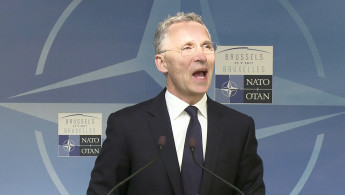NATO 'to join' global anti-IS coalition
Leaders from the global military alliance will formally endorse the decision at a summit on Thursday, sources said.
"The NATO (member state) ambassadors decided this evening on an action plan on terrorism for the summit. It includes the accession of NATO to the global coalition against IS," one diplomat said.
This specifically will involve an expansion of flights by NATO's AWACS surveillance aircraft currently supporting anti-IS operations in Syria and Iraq.
"This means that the AWACS will not just do airspace surveillance but airspace management," the diplomat said, asking not to be identified.
"They are going to coordinate the flights and direct airplanes over Syria and Iraq but only for flights which are not related to bombings."
Trump was due to meet NATO leaders in Brussels on Thursday to press his case, with the deadly IS-claimed bomb attack in Manchester high on the agenda.
Earlier on Wednesday, US Secretary of State Rex Tillerson said he expected NATO to join despite reservations by some members states which are fearful of getting dragged into another conflict.
All 28 allies have joined the anti-IS coalition of more than 60 countries, but NATO as an institution has not followed suit up to now, despite intense pressure from Washington.
Tillerson said that NATO's joining "would be a really important step" but that "there are a couple of countries that are still thinking it over."
"I have had meetings actually with one of those. I think they're going to support NATO joining and becoming a member of the ISIS fight," he told reporters, using another acronym for the Islamic State militant group.
NATO has baulked at taking on any combat role in the fight against IS and some allies such as France, Germany and Italy have been opposed for fear the alliance would be dragged into a ground war and risk its standing with Arab powers.
NATO chief Jens Stoltenberg said earlier that "many allies would like to see NATO as a full member of the coalition... because it sends a strong message of unity."
"Especially in light of the attack in Manchester, I think it is important to send this message of unity against terrorism."
Trump will also urge the allies to increase defence spending to the target of two percent of a country's annual gross domestic product, as they agreed in 2014.
In return, the allies hope the president will unequivocally state his support for NATO's core Article 5 collective defence commitment.
Asked about this issue, Tillerson said: "Of course we support Article 5. The only time Article 5 has been invoked was in the 9/11" attacks on the United States.
But he refused to be drawn on what Trump might say.
"He is still working on final remarks so I don't want to tell you exactly what is going to be in the speech," he said.





 Follow the Middle East's top stories in English at The New Arab on Google News
Follow the Middle East's top stories in English at The New Arab on Google News
![Israeli forces ordered bombed Gaza's Jabalia, ordering residents to leave [Getty]](/sites/default/files/styles/image_330x185/public/2176418030.jpeg?h=a5f2f23a&itok=_YGZaP1z)

